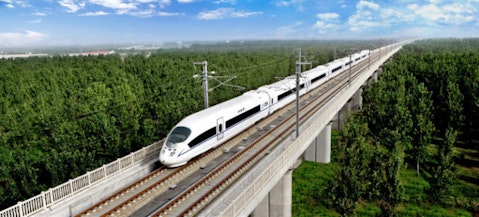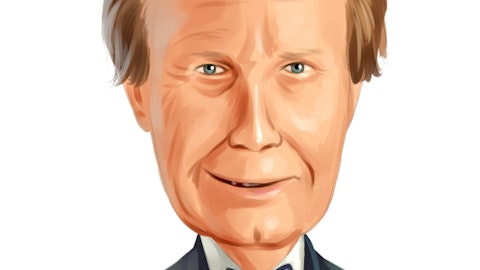FreightCar America, Inc. (NASDAQ:RAIL) Q4 2022 Earnings Call Transcript March 28, 2023
Operator: Greetings, and welcome to FreightCar America’s Fourth Quarter and Full Year 2022 Earnings Conference Call. At this time all participants are in a listen-only mode. A question-and-answer session will follow the formal presentation. As a reminder, this conference is being recorded. It is now my pleasure to introduce your host, Stephen Poe with Alpha IR. Thank you. You may begin.
Stephen Poe: Thank you, and welcome. Joining me today are Jim Meyer, President and Chief Executive Officer; Mike Riordan, Chief Financial Officer; and Matt Tonn, Chief Commercial Officer. I’d like to remind everyone that statements made during this conference call relating to the Company’s expected future performance, future business prospects or future events or plans may include forward-looking statements as defined under the Private Securities Litigation Reform Act of 1995. Participants are directed to FreightCar America’s Form 10-K for a description of certain business risks, some of which may be outside of the control of the Company that may cause actual results to materially differ from those expressed in the forward-looking statements.
We expressly disclaim any duty to provide updates to our forward-looking statements, whether as a result of new information, future events or otherwise. During today’s call, there will also be a discussion of some items that do not conform to U.S. generally accepted accounting principles or GAAP. Reconciliations of these non-GAAP measures to their most directly comparable GAAP measures are included in the earnings release issued yesterday afternoon. Our earnings release for the fourth quarter of 2022 is posted on the Company’s website at freightcaramerica.com along with our 10-K, which was filed yesterday after market. With that, let me now turn the call over to Jim for a few opening remarks.
Jim Meyer: Thank you, Stephen. Good morning and thank you all for joining us today. FreightCar America finished another very important year and its transformation and transition from a turnaround story to a growth story. Here are some of our most important accomplishments for the full year. We delivered revenues of $364.8 million, an increase of 80% year-over-year and above our previously provided outlook on deliveries of 3,184 railcars, an increase of 84% year-over-year. We delivered full year adjusted EBITDA of $8.4 million versus a loss of $7.2 million in 2021, an improvement of $15.7 million. We delivered our first positive full year of operating cash flow since 2017, generating $11.5 million versus a use of $55.4 million in 2021, an improvement of $66.9 million.
Including orders received shortly after the end of the year, our current production schedule for 2023 is essentially full, and we are now focused on our 2024 order book. While we continue to watch the rail industry with cautious optimism, the fact is that demand for railcars built by FreightCar America is strong. We continue to invest in and build a world-class manufacturing campus located less than 3 hours by car from Texas. We now have 3 production lines, a paint shop and fully capable fabrication and wheel and axle shops. By late summer this year, we expect to have 4 production lines and to double our paint shop capacity. In total, we will then have a facility fully able to produce 5,000-plus units per year without undue stress. Also, as announced yesterday, we entered into a very important refinancing, which, when closed in May, will extinguish all of our term debt and replace it with a nonconvertible preferred stock with our current financing partner, an affiliate of Pacific Investment Management Company.
Here are several of the more important aspects of this financial transaction. First and foremost, this transaction demonstrates the confidence of our financial partner, PIMCO, which has continued to support the growth and future potential of the business. This confidence is especially true, given the state of the capital markets, uncertain economy and current volatility in banking. Next, this transaction provides us with additional capital to invest in new initiatives to accelerate the next phase of growth. The additional capital is provided by excess cash at the closing of the deal, a significant reduction in fees tied to our ABL facility. And we will have the option to pay the dividend on the preferred stock on a payment-in-kind or PIK basis.
This equates to approximately $15 million in additional cash at closing plus an additional approximately $10 million per year in expected improvement in operating cash flows. We will also move from a variable rate loan structure on the extinguishing term loan to a fixed dividend on the preferred, which is obviously expected to be helpful in the current market environment. Finally, by eliminating most of the debt from our balance sheet, this financial transaction places us in a better position for further and lower cost refinancings in the future. While we are happy with this important first step to reshape our capital structure, we are still intently focused on achieving more conventional and lower-cost financing in the future. I will talk about our views on 2023 in a few minutes.
But first, I’ll turn the call over to Matt and Mike, starting with Matt for a few commercial comments. Matt?
Matt Tonn: Thank you, Jim, and good morning, everyone. We had a well-coordinated year in 2022, matching sales with the available capacity from two production lines for the full year and then a third production line starting in the fourth quarter. We have since done the same for 2023. With that in mind, for the full year 2022, we took orders for 3,208 railcars, of which 1,066 were booked in the fourth quarter. Very importantly, and an important internal metric for our company, we also increased the number of new customers by 36% in 2022, which is a true testament to the strength of our product offering, sales and technical talent and after-sales service. We ended the year with a backlog of 2,445 railcars valued at $288 million.
And although we typically do not talk in advance of the next quarter close, we booked significant orders in the first quarter of 2023. Hence, even with the additional capacity we brought online at the end of this year — last year, our current production schedule for 2023 is essentially full with booked orders now extending into 2024. Our focus as a company has been on orders for customers with unique product requirements and who place a premium on quality and service. This is our lane. And as a result of our efforts, we believe that FreightCar America is cementing itself as the preferred manufacturer in the industry. While some economic uncertainty and headwinds remain, overall, the railcar industry continues to demonstrate generally healthy fundamentals.
Railcar storage numbers remain below the 5-year average, and railcar retirements have outpaced new car deliveries for the past 3 years. With that said, we continue to closely monitor key economic indicators and the potential impact on our business and sector. So in short, we are cautiously optimistic about the industry, but much more optimistic about our own prospects within it. With that, I’ll turn the call over to Mike for a review of our financials. Mike?

Mike Riordan: Thanks, Matt, and good morning, everyone. I’ll begin with an overview of the fourth quarter financials, and then will touch on the full year 2022 highlights, some of which Jim already mentioned in his opening remarks. First, let’s turn to the fourth quarter results. Consolidated revenues for the fourth quarter of 2022 totaled $129 million compared to $75 million in the fourth quarter of 2021, an increase of 71.9% year-over-year with railcar deliveries of 1,150, an increase of 90.4% year-over-year. While we were pleased with the number of units and the quality of the cars we produced in the quarter, our gross margins and profitability were again impacted by deliveries of lower-margin railcar orders as we discussed on our previous earnings calls and continued supply chain pressures.
Gross profit in the fourth quarter of 2022 was $4.6 million compared to $6.6 million in the same period the prior year. And gross margin was 3.6% compared to 8.8% last year. Through actions taken by the Company in the fourth quarter, we will see margin improvement beginning in the first quarter of 2023 with continued improvement across the balance of 2023. SG&A for the fourth quarter of 2022 totaled $6.3 million, in line with $6.4 million in the fourth quarter of 2021. As a reminder, we’re committed to maintaining our current low-cost SG&A structure even as we continue to scale our production and add manufacturing capacity. Consolidated operating loss for the fourth quarter of 2022 was $6.2 million compared to operating income of $63,000 in the fourth quarter of 2021.
Consolidated operating loss in the fourth quarter of 2022 was primarily driven by lower gross profit and a $4.5 million impairment on leased railcars. In the fourth quarter of 2022, we achieved a positive adjusted EBITDA of $1.2 million, which was equivalent to the same period last year. For the fourth quarter, our adjusted net loss was $8.1 million or $0.31 per share compared to an adjusted net loss of $3.1 million or $0.14 per share in the fourth quarter last year. Adjusted net loss excludes the impact of certain noncash and nonrecurring charges such as the $4.5 million impairment on leased railcars, the onetime Mexican VAT cost of $1.9 million and noncash income of $4.7 million due to the change in the fair market value of the warrant liability.
As a reminder, the change in fair market value of the warrant liability fluctuates each quarter, primarily resulting from the change in our share price during the period. Interest expense in the fourth quarter of 2022 was $7.9 million compared to $4 million in the fourth quarter of 2021. This was primarily driven by an increase in noncash deferred financing fee amortization between the comparable periods. Capital expenditures for the fourth quarter of 2022 were approximately $4.4 million as we continued expanding our manufacturing footprint. For the full year, it was $7.8 million. Looking ahead to 2023, we will have a step-up in capital expenditures and expect it to be approximately $11 million for the year. This increase in CapEx will support additional investments, including increased blast and paint capacity, our fourth production line and further expansion of our in-house fabrication capabilities.
For the full year 2022, we are proud of our achievements, which included significant expansion projects, top line growth and improved profitability. Adjusted EBITDA for the full year was $8.4 million, a $15.7 million improvement from 2021. We did this in spite of producing a large number of orders taken during a particularly challenging period for pricing coupled with inefficiencies generated by supply chain challenges. This, therefore, speaks directly to the positive operational leverage and favorable cost structure of our Castaños footprint. As I’ve highlighted the last two quarters and Jim touched on earlier, our operating cash flow has significantly improved with cash generated from operating activities of $11.5 million in 2022, positive for the first time since 2017 and compared to cash used in operating activities of $55.4 million in 2021, a $66.9 million improvement.
With that financial overview, I’d like to now turn the call back over to Jim for a few closing remarks.
Jim Meyer: Thanks, Mike. Let me conclude by providing an overview of our outlook and priorities for 2023. Once again, we are cautiously optimistic on the market. And we are quite positive on our position within the market and demand as it relates to our railcars. Our production schedule for 2023 is essentially full, and the number of inquiries we continue to receive is very encouraging. We will continue to expand in 2023, and we’ll prepare for even more growth in 2024. For the full year 2023, we’re forecasting revenue of between $400 million and $430 million, up approximately 14% year-over-year at the midpoint of the range. This projection is based on expected deliveries of between 3,400 to 3,700 railcars, an increase of approximately 11.5% at the midpoint of the range.
Additionally, we are introducing adjusted EBITDA guidance of between $15 million and $20 million for the full year. This represents a very significant year-over-year increase of 108% at the midpoint and further demonstrates the fruits of our turnaround. Finally, we expect positive operating cash flow for the second consecutive year. We have better clarity on our anticipated results for this fiscal year than we have had in a very long time and are increasingly confident in the outlook. The key focus for our team this year will be to execute and deliver the business in hand, continue to build backlog for next year and create an opportunity for further improvement in our capital structure. Outside of these important priorities, we continue to have discussions around the future and how best to leverage the impressive manufacturing campus and dedicated workforce that we have put together in Mexico.
That concludes our prepared remarks, and I’ll now turn the call over to the operator so that we can address your questions.
See also 12 Most Profitable Gold Stocks and 16 Best Places to Live in Texas.
Q&A Session
Follow Freightcar America Inc. (NASDAQ:RAIL)
Follow Freightcar America Inc. (NASDAQ:RAIL)
Receive real-time insider trading and news alerts
Operator: Our first question comes from the line of Justin Long with Stephens.
Justin Long: So, maybe to start with the commentary around year-to-date orders, when I think about the guidance that you just laid out for deliveries in 2023 and the backlog that you ended the year with, it seems to imply that you’ve received somewhere around 1,000 orders so far this year. So, I just wanted to double back and see if that math is correct.
Matt Tonn: Yes, Justin, we won’t get into the specifics, but it’s significantly more than that.
Justin Long: Okay. Got it. That’s helpful. And I guess in terms of that delivery guidance, you mentioned it’s an increase from 2022. But it feels like your capacity to produce railcars could be significantly higher than that guidance. So maybe you could help us think through potential for upside to that delivery outlook or if there’s a strategic reason why you’re kind of limiting builds within that range?
Jim Meyer: Yes. Justin, this is Jim. Good morning. We’re — the guidance we’ve given is what we see and expect to build at this time, obviously. It’s guidance and volume that’s associated with 3 production lines running for the full year. Is there opportunity or upside beyond that? That is really going to come down to a question of when we decide to start ramping up production line number 4 and if we decide this year to start ramping up production line number 4. Every time we bring on a new production line, we add and train 1 to 2 shifts’ worth of people. So, it’s a significant investment. And we’ll make that decision at the right time depending on not just near-term orders in hand but what the longer-term outlook looks like. So the guidance we’ve given to summarize is for the 3 production lines that we have up and running. And whether we move off of that upwards really is going to depend on kind of a longer-term view on investing in and ramping up the fourth line.
Justin Long: Got it. That’s helpful. And I guess in terms of the adjusted EBITDA guidance that you provided for 2023, any way to help us think through the gross margin assumption that’s baked into that outlook and the level of visibility you have in terms of some of these supply chain issues getting better?
Jim Meyer: Yes. Justin, let me start, and then I’ll pass it over to Mike. Where I’ll start is as a company, we are focused very much on 2 priorities. One is EBITDA generation, and the other is operating cash flow. And so, as we think about plan and operate our business, that’s where our two priorities are. I’ll let Mike comment further as it relates to your question on gross margin.
Mike Riordan: So what I’d say is we’ve given revenue and adjusted EBITDA, and we’ve talked previously about our SG&A and how we keep that low cost and relatively fixed amount. So, I think from those, you could kind of back into gross margin for modeling purposes.
Justin Long: Got it. But any color you can provide on the cadence of those gross margins as we progress through the year? I know you alluded to the supply chain issues continuing in the first quarter and then getting better thereafter. Just wanted to make sure I kind of understood that progression.
Mike Riordan: Sure.
Jim Meyer: Go ahead.
Mike Riordan: Sure. So as I mentioned, we’re going to see relative to Q4, a pretty significant increase in Q1 in our margin rate as we’ve taken several actions in the fourth quarter of 2022 to better ourselves for this and address those supply chain issues. And then the balance of the year, we’ll continue to see favorability to the margin we even see in Q1.
Operator: Our next question comes from the line of Matt Elkott with TD Cowen.
Matt Elkott: Helpful commentary on the gross margin progression throughout the year. Is there any way you can give us maybe just like a ballpark of where you expect maybe to exit the year as far as the gross margin?
Jim Meyer: Matt, hi, good morning, this is Jim. We’ve not given guidance on gross margin. You’re supposed to congratulate us for giving guidance on EBITDA.



